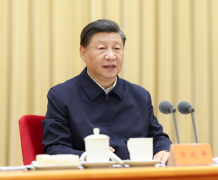Chinese university plan causes security concerns in Hungary
Hungary's government plans to host a Chinese university campus in its capital Budapest
May 2, 2021, 11:31 AM
5 min read
Share to FacebookShare to TwitterEmail this articleIn this image provided by Budapest City Hall, Gergely Karacsony, Mayor of Budapest, right, and Krisztina Baranyi, the mayor of Budapest's 9th district, left, pose together for a photo at the planned site of the Chinese Fudan University campus in Budapest, Hungary on April 26, 2021. Hungary's right-wing government envisions the construction of a gigantic university which has pledged its allegiance to the Chinese Communist Party, while others, like Karacsony and Baranyi, oppose the plan saying the project could have national security risks. (Budapest City Hall via AP)
BUDAPEST, Hungary -- Piles of garbage, discarded debris and abandoned buildings are scattered across a post-industrial area on the left bank of the Danube River, just south of the grandiose downtown of Hungary's capital, Budapest.
The area has been unused for decades, languishing in post-socialist decay in the 30 years since anti-communist firebrands pressed for the end of Soviet domination in Hungary at the end of the 1980s.
But it's here that one of those early reformers, Hungary's right-wing nationalist prime minister, Viktor Orban, envisions building a gigantic university that has pledged its allegiance to the Chinese Communist Party.
This week, Hungary signed a strategic agreement with the Shanghai-based Fudan University on opening a campus in Budapest by 2024. It would be the school's only foreign outpost, and the first Chinese university campus in the 27-nation European Union.
Hungarian officials insist that Fudan, ranked among the top 100 universities in the world, will help raise higher education standards in Hungary, providing courses to 6,000 Hungarian, Chinese and other students and bringing Chinese investment and research into the country.
But critics say the massive investment places an undue financial burden on Hungarian taxpayers and shows Orban's warming ties with autocracies in Moscow and Beijing.
“They want to bring in a university, which is indeed a serious university on the international level, but its charter requires that it represent the worldview of the Chinese Communist Party,” said Budapest mayor Gergely Karacsony, who opposes the plan. “We see very serious national security risks in this investment.”
Government documents obtained in April by Hungarian investigative journalism center Direkt36 show that pretax construction costs for the 64-acre (nearly 26-hectare) campus are estimated at $1.8 billion, more than Hungary spent on its entire higher education system in 2019.
The state plans to finance around 20% of the project from its central budget, and the rest through a $1.5 billion loan from a Chinese bank. According to the documents, construction will be carried out using mostly Chinese materials and labor.
“The Chinese are doing everything, while we’re doing only one thing: paying,” Karacsony said. "Any prestigious university in the world would open a campus here if the Hungarian taxpayers paid for everything.”
Hungary’s government, which engages in frequent battles with the EU, has pursued an economic strategy its calls “Eastern Opening,” which favors increased diplomatic cooperation and trade with countries like China, Russia, Turkey and others in Central Asia.
Karacsony said the policies had made Hungary ”a kind of advanced bastion of Eastern great powers in the European Union.”
Last year, Hungary agreed to take out a $2 billion loan from China's Exim Bank to build a railway line between Budapest and Serbia's capital of Belgrade, part of China's global Belt and Road initiative.
Hungary also hosts Chinese telecommunications firm Huawei's largest supply center outside of China, and is the only country in the EU to have approved a Chinese COVID-19 vaccine.
According to Peter Kreko, director of the Budapest-based think tank Political Capital, the Fudan development is part of China's efforts to extend soft power and influence through education programs and investments. He echoed concerns by Budapest's mayor that the project could open the door to espionage.









